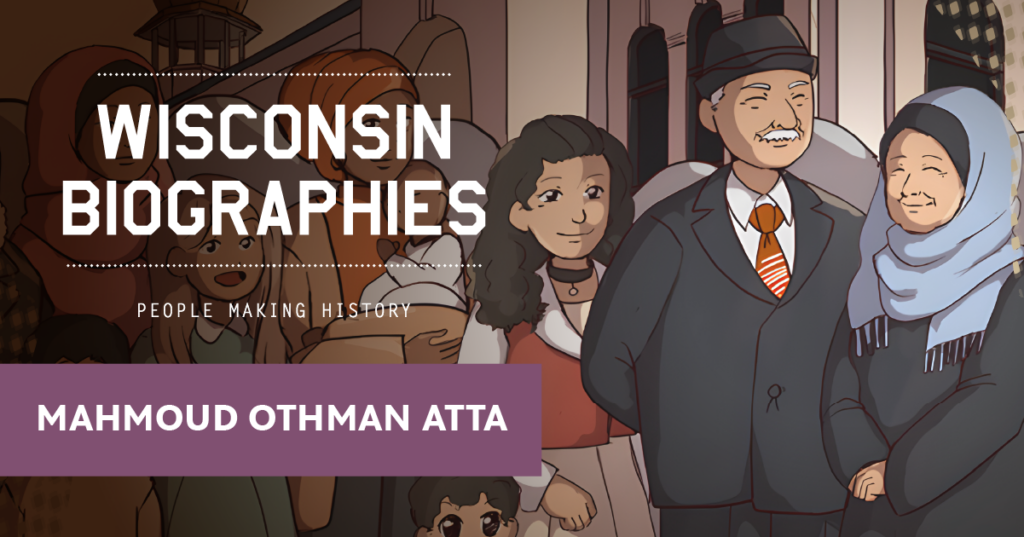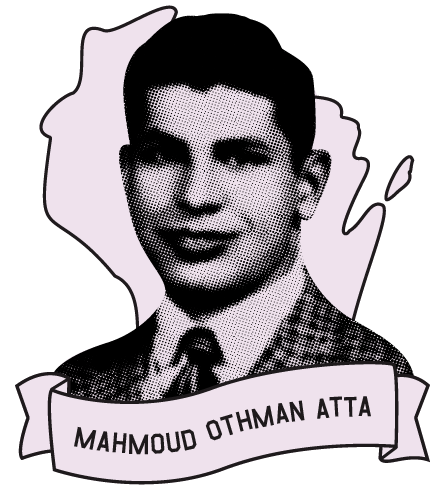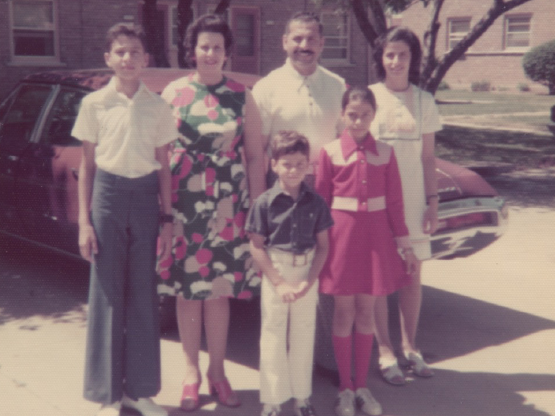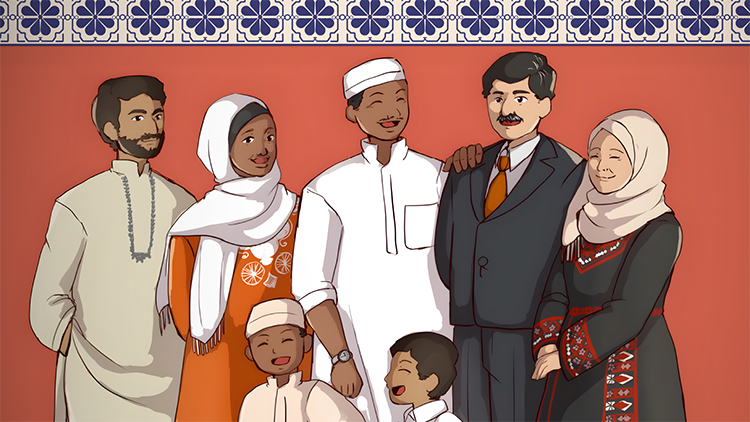‘Mahmoud Othman Atta: A Mosque for Milwaukee’ animation now available — read a Q&A!
April 28, 2023 Leave a Comment
PBS Wisconsin Education has released a new Wisconsin Biographies resource titled, Mahmoud Othman Atta: A Mosque for Milwaukee. Wisconsin Biographies is a collection of free educational, online media resources that shares the stories of notable Wisconsinites and enriches grade school social studies and literacy curriculum.
Born in Palestine in 1936, Mahmoud Othman Atta came with his father to Milwaukee as a teenager. During his childhood, Atta’s father had made frequent trips from Palestine to the United States to sell goods as a peddler to support his family. Atta completed high school in Milwaukee, served in the United States Army and returned to Palestine to marry. Not long after, war in the Middle East forced Mahmoud and his family to leave Palestine. Seeking a sense of community, Atta and his family made Milwaukee their home and worked with others to open the first mosque in Milwaukee open to all Muslims.
On the Wisconsin Biographies website, students in grades 3-6 can explore Atta’s story through an animated video, digital book with audio and image gallery. Atta’s digital book is available in English and Arabic. An educator guide provides additional resources and extension activities.
Mahmoud Othman Atta: A Mosque for Milwaukee is part of the larger Wisconsin Muslim Project, a collaboration between PBS Wisconsin and two other Wisconsin-based partners, the Milwaukee Muslim Women’s Coalition and We Are Many – United Against Hate. The project aims to stimulate connections between Wisconsin’s Muslim and non-Muslim populations, and encourage us to obtain greater knowledge about, empathy for, and appreciation of one another.
Mahmoud Othman Atta: A Mosque for Milwaukee is available for free online access.
PBS Wisconsin spoke with the biography’s producer David Boffa to learn more about how the project came together.

PBS Wisconsin: Tell us you how you got involved with this project?
David Boffa: I was hired to do Wisconsin bios. I started in September of 2021 and this and another bio were my first projects. It was like the introductory phase, where you’re figuring out the logistics of working for PBS Wisconsin and then it was like just diving into the Building Bridges project linked to the grant. My first tasks were to identify a subject for this biography. I spent a lot of time working with the recommendations that had been provided by some of our partners and collaborators, and then reaching out to other people, historians, other Muslim Americans to try to figure out if there were other candidates I should look into and then getting some feedback from educators to figure out what was important for them. Then I chose Mahmoud.
PBS Wisconsin: Had you heard of Mahmoud before this project?
Boffa: No, not at all. I was not super aware of Wisconsin’s Muslim history in general, to be honest.

Mahmoud Othman Atta as a young man.
PBS Wisconsin: Tell us about the production process for this project.
Boffa: I spent time working on some research and then I spent time talking with the family and getting notes from them and figuring out the story and then writing drafts of what the story arc might look like and sharing those with PBS Wisconsin Education executive producer Megan Monday. Then we just go through script drafts. I’d write a script and then send it to her, get feedback, rework it, feedback, rework it. That goes on for a while, obviously with input from the family and our advisors. Then we take that to the educators. We do an educator cohort run by Mia Forslund, our coordinating producer, and we get feedback from educators because these are going to be used by educators and we want to make sure these resources address their needs.
Also, at that point I’m working on an AV script to figure out what are the visuals that are going to accompany the narration. Rodney Lambright was also working at PBS Wisconsin in the animation department, and he was helping out with those visuals and creating a series of storyboards. We put that together, that becomes our animatic, and that is like mixing these still drawings with a rough track of the voiceover. Just to figure out, do the scenes match up with the voiceover? Are there enough? Do we need to cover more things? We get more feedback from educators and once we’re happy with that, we then bring in our voiceover artist who in this case was Mahmoud’s son Othman, who has a beautiful voice.
From there the art process starts. We identified a young Muslim woman we wanted to work with as an artist. We start giving her scenes and she develops scenes and characters, and we share photos from the family and historical photos. PBS Wisconsin animator Steve Dorchester was doing the rigging of those characters and backgrounds. That’s a long process of getting everything rigged, doing the animation and again, going to the family and advisors, making sure things look okay, and is culturally appropriate. Then finally adding sound design and music.
PBS Wisconsin: The mosque that Mahmoud was involved in establishing was founded in the early eighties, but there were other mosques in Milwaukee before that. The distinction between the other mosques that were established before and the one he was involved with was that his was open to all Muslims. Why was that such an important distinction for him?
Boffa: As his family explained it, there were at least a couple of mosques, but they were limited to the new Black Muslim movement, and their concern was they needed a safe space. They were at risk not only because they were Black Americans but also because they were Black Muslims. I believe Mahmoud did on occasion go to those mosques because he was involved with the Black Muslim community and with teaching them, sharing prayers with them. But he also understood why it was important for them to have a space that was just theirs. He wanted a mosque because he felt like that was the missing key to feeling like this was home. It was so important to him to have a place for a very multicultural, multiethnic Muslim community that was becoming the norm in Wisconsin, at least in a place like Milwaukee.

Mahmoud Othman Atta (center) and family.
PBS Wisconsin: What was Mahmoud’s family’s response when they saw the animation?
Boffa: They were thrilled. They were really excited. They have sent some really nice emails, feeling like their story is told and that they appreciated the communication every step of the way. I should note too that we have appreciated them every step of the way. There was always this dialogue between us and the family and our advisors, making sure we were getting things right. Especially because we’re dealing with sensitive subject matter.
It’s somebody’s personal history, but also the Israeli Palestinian conflict is sensitive subject matter. It is important to be honest about it, but also, to reference something Janan, Mahmoud’s daughter told us, you don’t want to only tell the story of Palestinians as a story of war and depression and suffering. There’s so much more to their story. You don’t want to suppress that because it still is the case. But, you want to make sure you’re showing Muslims, Muslim Americans, Palestinian Americans in a way that they’re not typically shown in mainstream media — in a positive way and in a way that gives them agency over how they’re shown.
PBS Wisconsin: What do you hope students take away from this resource?
Boffa: For non-Muslim students, I really hope they learn something about a different culture, a different faith that maybe they didn’t know anything about or maybe that they had a bunch of misconceptions about. I think that’d be great. I think it’d be great for them to take away maybe some more empathy around refugees and immigrants and people who are struggling to find a home and make a home in a place that they didn’t anticipate being in. For Muslim students, I hope they feel a sense of pride at seeing a representation like this and feel a sense of being more in control of the narratives around Muslim Americans and their own stories. I hope everyone gets a little something out of it and learns something.
 Passport
Passport





